Who do you think you are? And is the answer in your genes? This month we're delving into genes and genealogy. Plus, putting an end to genetic determinism, and an ancient Egyptian gene of the month.
In this episode
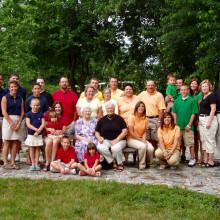
00:57 - Prof Mark Jobling - Genes and genealogy
Prof Mark Jobling - Genes and genealogy
with Professor Mark Jobling, Leicester University
Kat - In recent years we've seen an explosion in people digging into their family history, tracing their family trees. And with the advent of cheap gene sequencing, there's a new field of recreational genetics springing up, as people try to unpick their genetic ancestry. But what can our genomes actually tell us about where we came from and who we are? Professor Mark Jobling, at the University of Leicester, is a leading expert in human genetics and genealogy, so I asked him for some answers.
Mark - Well, the human species is remarkable for the fact that it covers almost the entire habitable surface of the Earth and has very, very large numbers. But that situation has arisen in a very short time compared to other species. So, it's only about 200,000 years since our species originated. During that time, there's been a migration. We know from various lines of evidence that humans originated in Africa about that time and then migrated into the old world. Thereafter, there were several further migrations. In more recent years, we've had contact between populations that have been separated for very long periods of time.
So, we're interested in looking at modern human genomes, the genetics among human populations and trying to disentangle various aspects of those migration histories. But I guess you could ask, "Well, don't we know a lot of that anyway from history and other sources?" The answer is, we know some things, but not enough. There's also often conflicts between different sources of evidence. So, genetics has something new to bring to try and to understand how we ended up in the way we are.
Kat - And what sort of things you're actually looking at when you talk about the genetics of different populations? What sort of things differ genetically between people?
Mark - Well, the first thing to say is that, people are all very, very similar to each other indeed. That's the important thing to stress. We always talk about the differences, but in fact, we're 0.08% different. We are a very uniform species. So, we focus on the very small number of differences. Beyond that, we look at differences between populations in order to try to understand when particular groups of people move from one place to another.
And so, we might think for example of the migration of the Jewish diaspora. People originated and moved about 2,000 years ago across Europe or the migration of the Roma people - sometimes called gypsies. They originated about 1,000 years ago in northern India and then migrated across Europe. Or more recent events like the transatlantic slave trade which brought African people together with people who've been living for thousands of years in the Americas and with people previously been living in Europe. So, there have been a lot of these complex mixture events and you can look at differences between populations - these very small differences - to try and illuminate those events.
Kat - What sort of things can you tell? What sort of resolution can you get? Can you tell for example that a whole bunch of people all came from one family, one starting person for example?
Mark - Well, it depends which bit of the genome you look at. So, you can look at individual genomes. Good examples are the Y-chromosome which passes from father to son or mitochondrial DNA which passes from mothers to all of their children. So, those form what are called gene genealogies. They're not necessarily referring to genes themselves, but you can look at the pattern. You can form a family tree of all of those sequences in the world and look at the pattern of those in different populations.
So, that has some advantages in that it's rather simple to understand, but some disadvantages because as you said, you're looking in the case of all Y-chromosomes and essentially, one pedigree. So, that all modern Y-chromosomes descend from one single man who lived at some point in the past. Similarly, all mitochondrial DNAs descend from one woman who lived at some point in the past. So, those are only telling us about single ancestors in any one person's actual genealogy. So, there's simplicity there which gives advantages and disadvantages.
So now, we have whole genome methods of trying to understand diversity and that again brings advantages and disadvantages. So, on the one hand, we're looking at the entire genome or 'snips' (SNPs) that are distributed across the genome and that gives us many different evolutionary stories. Almost each snip has a different story to tell. We're looking at the averaging of those and that gives us a kind of a general picture of how populations are related together, but it doesn't tell us about individual ancestry.
Kat - Because that's something that people are very interested in. There's a whole industry of people looking at their family history, their family trees, trying to work out where they came from, where their origins were. What sort of things are going on in this kind of area of recreational genetics that intersect with the sort of work that you do?
Mark - Well, you're right to say that people want to know where they came from or where their ancestors came from and there's a big problem there because each one of us has two parents and they have two parents each, and so on back in time. So, if you go back just a few hundred years, the number of notional ancestors anyone of us had is much greater than the current population of the entire planet. So, we have many ancestors in common which explains why that number thing happens. But at the same time, for any one of us to say, "Well, where did my ancestors live, say, 1,000 years ago?" is a meaningless question because they must have lived in many, many different places. So, the simplest and most accurate answer to that question is everywhere.
So, there's a tension there between the public wanting this kind of ancestry story, the sort of, 'who do you think you are' story about their genealogies, and what genetics tells us about ancestry which is that it is complex, multifaceted and we have many ancestors. So again, that's why there's been this focus, going back to mitochondrial DNA and Y-chromosomes. That's why those have become such a focus because there, there really is a single ancestor at some point in time that you can point to and say, "This man is my great, great, great, times 'n' grandfather or this woman is my similar grandmother." And there's a great attraction to that.
What it leads to is a focus on those two kinds of ancestors - the patrilineal and matrilineal ancestors - simply because they're easy to understand and think about. But they're no more special than any other of the ancestors that we would've had at that time.
Kat - They're just the ones we can spot.
Mark - They're the ones we can spot, exactly. I think that there's burgeoning in the number of companies doing genetic ancestry testing and I think some of them, they try and oversimplify things, such that they're saying something about somebody's ancestors from a single lineage and that's a bit of a slightly misleading to do, I think.
Kat - So, given that you're very well-known for working in the area of genetics and population studies, do people often contact you with questions about their family history, about their genealogy? What are the most common things that people ask you about?
Mark - Yes, we do get a lot of queries. I mean, some of them are quite surprising and amusing. So, there's a strong desire among men in particular to be connected to the Vikings in the past. More broadly and seriously, we get quite a lot of questions from people who phone up or send emails about events in their own family history. Particularly common is people who found they've been born by artificial insemination by donor. So, they have no information about their father or people who turn out to be adopted. And again, there's no information.
Kat - And finally, have you had your genome analysed in any way and what did you find in it if you did?
Mark - Well, not very comprehensively. No, I act as a kind of control DNA sample in every experiment that's done in the lab. So, I know my Y-chromosome type which is called I1a and it's one of the ones that people regard as a Scandinavian lineage so that much I can tell you. The rest of my genome, I can't really tell you anything about. I've showed a surprising lack of interest in my own genome, given that what we do is work on everybody else's.
Kat - That was Professor Mark Jobling from the University of Leicester.

08:34 - Mark Henderson - Genetic determinism
Mark Henderson - Genetic determinism
with Mark Henderson, Wellcome Trust
Kat - Now it's time to hear from the winner of the Genetics Society's first ever JBS Haldane lecture - Mark Henderson. Mark is head of communications at the Wellcome Trust, and author of the books 50 Genetics Ideas You Really Need to Know and the Geek Manifesto. He's been recognised for excellence in communicating to the public about genetics, and has just delivered his prize lecture at the British Science Association festival in Newcastle. I met up with him before his talk and asked him to reveal some of the things he planned to say.
Mark H. - What I'm really going to be trying to frame the lecture around is, what I think is often the biggest problem in the way that genomics gets communicated, which often leads to some misframings I think of some of the social challenges that we face as a result of development particularly in medical genomics. And the problem, the misframing, it really boils down to this, which is that genomics is usually - in the popular imagination at least - understood as a deterministic science whereas in actual fact, it's much more often a probabilistic one.
Kat - So, you hear these stories, "It's a gene for this", "It's a gene for fat", "It's a gene for cancer", this and that, where the picture you fill needs to be communicated in a much more subtle way.
Mark H. - That's exactly right. What has happened I think it's that largely because some of us that have lowest hanging fruit of genomics were actually very deterministic genes, things like the mutation that causes Huntington's disease. If you get that mutation, you get that disease. The recessive mutations that cause cystic fibrosis, if you inherit two of them, you will get cystic fibrosis. There are a number of well-known genetic conditions that work in exactly that way, and they're the well-known genetic conditions out there. As a result, there has been this widespread framing of genomics is something that's very deterministic. You have this gene, you have this mutation in this gene, you will get this disease, inevitably.
Now, that's true in a very small subset of diseases and it's true actually in some of the cases in which genomics is starting to make the swiftest inroads into medicine. It's true for example of very rare developmental disorders where a mutation causes often severe mental retardation, or something like that, where genomics is having a really big impact already. It's sometimes true in cancer, although in slightly different way where we're talking about acquired mutations in somatic cells most normally and even there, it's not just one mutation that causes the cancer but usually, a cascade of several mutations that are necessary. So, there are some cases in which that determinism is correct.
But more broadly, it's not actually the case. Most of the common conditions that we know about - diabetes, heart disease etc. - are influenced by lots and lots of genes which tend to have very small effects. That's even more the case when you start to look at what you might describe as more social traits - things such as intelligence or height or obesity, or anything like that. And so, I think if we're to start to think properly about how and why genomics is going to end up having an effect on some questions for society, we need to start from that point of understanding that for the most part, it is a probabilistic science and not a deterministic one.
Kat - What changes would you like to see in the way that genetics and genomics is communicated? What do you think could really make the most impact in bringing about these changes?
Mark H. - I think we have to get away from this language of 'gene for this' or 'gene for that' as you eluded to earlier, you'll see all the time in newspaper headlines, the fat gene or the binge drinking gene, or things like that, and frankly, there is no fat gene. There is no binge drinking gene. Some of these qualities, these traits may have an element of genetic influence, but there'll be many genes that are involved and of course, many environmental factors as well. I think what tends to happen as a result of this sort of 'gene for' narrative is you get two almost conflicting responses, both of which are wrong.
One is this idea that genomics and medical application of genomics is going to be terrifically simply and that actually, it's going to be dead easy to predict what people are going to die of in 50 years' time by measuring their genome. So, you're going to be able to tell how intelligent somebody is by looking at their DNA. That's frankly just not the case. There will be slow progress, slow incremental progress in applying insights of very specific targeted bits of the genome to medicine as we're seeing already in cancer and rare disease, some infectious diseases.
It's not for the worried well who are going to be able to predict exactly whether they're going to get cancer 20 years in the future. Frankly, whether that comes around is, I think. quite a moot point. The other thing actually is that genomics causes all sorts of very complicated ethical problems, and it does cause a number of ethical problems. But some of them I think overblown because of this idea that everything is a gene for this and gene for that.
Kat - It feels like it really needs to go hand in hand with better understanding of risk and what does risk actually mean for you as an individual.
Mark H. - That's absolutely right, and something I think that also flows out of this is that very many people are concerned about, for example, what insurance companies will do with genetic data or what employers might want to do with genetic data. Are you going to have to take a genetic test before you apply for certain jobs? That's where I think some of this probabilistic, deterministic stuff really matters.
I think that measuring somebody's DNA is going to be an absolutely appalling way to test their aptitude for any jobs. It's going to reveal virtually nothing. But if you want to measure how intelligent somebody is or how conscientious they are or how good their IT skills, or something like that, the idea you're going to be able to do that by measuring somebody's genome is frankly rather ludicrous. And if we do need to think about laws against genetic discrimination, it's not because genetic discrimination will work. It's because it won't work and we probably need to save people from themselves.
Kat - That was Mark Henderson from the Wellcome Trust, winner of this year's JBS Haldane prize lecture from the Genetics Society. And I'd like to remind you that the Genetics Society's Autumn meeting, looking at how the information in genes is interpreted to create biological shapes - from limbs to leaves - will take place at the Royal Society on 7th and 8th November. If you want to go, just register now at genetics.org.uk
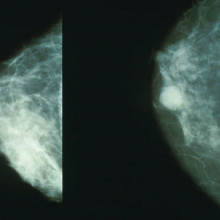
16:12 - Stress and cancer link?
Stress and cancer link?
Researchers in the US have taken a step forward in understanding how the body's response to stress might be linked to the spread of breast cancer. Publishing their findings in the Journal of Clinical Investigation, the team focused on a gene called ATF3, which is switched on in immune cells in response to stresses such as radiation, or a high fat diet. The researchers found that cancer cells somehow send out 'stress signals' that influence neighbouring immune cells to switch on the gene, which subverts them, allowing the cancer cells to escape and start spreading.
Although the evidence linking stressful life situations to cancer is somewhat unclear, the researchers think their finding could provide a plausible biological pathway linking stress to cancer spread. The exact details of what's going on still aren't clear, so there's a lot more work to be done before this knowledge can be turned into treatments or preventive approaches for cancer.
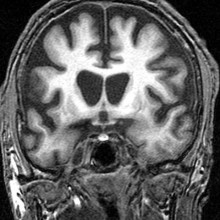
17:05 - Hope for Huntington’s Disease
Hope for Huntington’s Disease
Writing in the journal Nature Genetics, researchers at the University of Leicester have made a discovery that could lead towards a new hope for fighting Huntington's disease - an incurable, degenerative genetic disease affecting the brain. Using a combination of yeast, fruit flies and mammalian cells grown in the lab as models, the researchers found that an enzyme called glutathione peroxidase - which is an antioxidant within our cells - can protect against the sign of Huntington's in these model systems.
The scientists hope their finding could be taken forward to develop a treatment for the disease, which affects thousands of people in the UK and many more worldwide. Importantly, chemicals mimicking the activity of the enzyme are already in clinical trials for other diseases, which might make it quicker for new approaches to be tested in Huntington's patients.
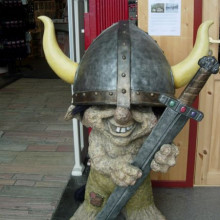
18:07 - Dr Turi King - Men, genes and families
Dr Turi King - Men, genes and families
with DR Turi King, Leicester University
Kat - Now it's time to take another look at genes and genealogy. Dr Turi King, at the University of Leicester has a particular interest in men - purely in the academic sense, of course. I spoke to her to find out how to trace men's genetic ancestry, and how to spot the Vikings in our midst.
Turi - I've actually been mainly looking at Y-chromosomes. So, I've been looking at the link between surnames and Y-chromosome. I've been using surnames as a way to sample men as a way of looking at population movements in the past. So for example, I'm interested in the Viking migration to the north of England. And so, I'm looking for people who've got long ancestry in that area and how do you find people who've got long ancestry? Well, we know that if people have surnames that are thought to have originated in that part of the country, chances are, their ancestry goes back to that country hopefully, to about the time when surnames start to become established about 700 years ago.
And then what I do is I look at men's Y-chromosomes and I do this on a population basis. So, I'm looking at many men and I'm looking at the Y-chromosome types, and I'm looking to see whether or not as a population, they look like they've got a high proportion that looks like Scandinavian ancestry.
Kat - What can you find from that? What can you tell about the Vikings in our midst so far?
Turi - Well, I'm still in the middle of this project, so I'm just finishing off the typing. But it's actually a much larger extension of a pilot project that we did several years ago where we tried this, can you do surname base sampling, does it give you a better indication of what the population look like say, several hundred years ago, and we did that in the Wirral and West Lancashire.
So, we took men who had very old surnames from this region and then we compared them to men where we had just sampled them just on the basis of grandparental place of birth - was your grandparent born in this area? - okay, so your ancestry goes back at least a couple of generations. And then we took men who had the very old surnames and then we kind of compared them and it was interesting because if we looked at the men with the old surnames from the region, they had higher proportions of what look like Viking ancestors, Scandinavian ancestry. So, it looks like you can use certain surnames as a way of sampling individuals who look at population movements in the past.
Kat - Now, this only works because a man has a Y-chromosome and that's passed from father to son, to son to son, and also, surnames are passed from father to their family and so on. Does it get a bit difficult and mixed up in some cases where there's migration from different countries or in cases where surnames aren't inherited from their father?
Turi - Yes. So, I mean, I've just been concentrating on Britain, but obviously, there are parts of the world where surnames haven't been inherited from father to son for a very long time. So, Norway is actually one of those places where it's relatively a recent thing to have heritable surnames. So, it really does work in countries where you have this long tradition of heritable surnames where you get this Y-chromosome and surname, passing down together down through the generations. It allows you to look at migration. It's interesting in terms of looking at population movements because again, you can look for surnames that look like they come from other parts of the world. And that would tell you probably a lot about more recent migration.
Kat - What sort of work are you doing to try and understand in more depth where Britain's population has come from over recent centuries?
Turi - Honestly, I'm mainly concentrating on the Viking migrations to Britain and using surnames as a way to sample individuals. And then obviously, what I need to do is I need to have samples from Norway. So, I've been sampling in Norway, finding men who have got long ancestry in regions of Norway. So, I'm interested in knowing whether or not there's differences between populations in Norway. And then also, whether or not we can see within the Y-chromosomes of men living in the north of Britain, can we tie them back at all to any particular parts of Norway or does it just look like a mix with those kind of thing? It's all kind of a work in progress at the moment.
Kat - And the one thing that we do know is that Britain is a real patchwork of people that have come from all over the place. Is there much known about some of the other migrations, where this mixed bag of people we call Britons has come from?
Turi - Well, so that's really interesting because the reason why I can look at the Norse migration to Britain is because the frequencies a particular Y-chromosomes in Norway are slightly different from what you find in other parts of say, northern Europe.
Kat - So, it's very characteristic of Vikings?
Turi - Well, of the Norwegian populations. So you get particular frequencies. It's one of these things that is actually really, really difficult to look at things like the Norman migration or the Anglo-Saxon migration, or the Danish Viking migration because they are all migrations from the same part of Europe, just separated by a few generations. So, you can't really tease out, "That's an Anglo-Saxon or that's a Danish Viking or that's a Norman" because there just hasn't been enough differentiation in the Y-chromosome types. It's certainly not the level of typing that is available at the moment.
Kat - And have there been any particularly exciting stories or very strange things that you found, maybe specific families that you thought that's a bit odd?
Turi - Well, we had a really lovely case. So, I was typing this chap and he lived in Leicester and I had done it through postal typing. So, he just volunteered to take part in this surname project so I had no idea what he looked like or anything. I was typing his Y-chromosome and I was doing this and I thought, "Okay, this is looking unusual." He had a really rare African Y-chromosome type. So, we thought, "Okay, what will we do? We'll bring him in and ask him if he knows whether or not he's got African ancestry. Maybe he's African Caribbean. We're in Leicester. It's a very multi-cultural city." He came in and he just looked indigenous British and knew of no African ancestry, but he had this very interesting African Y-chromosome type.
So, I sampled other men with the surname and about a third of them all carried this very rare type. So, it's really nice. I mean, the obvious way is, this Y-chromosome type came to the country is either through the Romans. We know that they had a garrison of African soldiers guarding Hadrian's Wall and also through the slave trade, and that seems to be the most obvious route. It brought huge numbers of people from Africa to be used as sort of domestic servants and musicians, and obviously, some of them would intermarry and so obviously, this interesting Y-chromosome type has become part of this family. Hence, it's something really interesting in their past.
Kat - Maybe one of the stories that's really hit the headlines you've been working on is about Richard the Third. What can you tell me about that?
Turi - I'm trying to do the Y-chromosome side and it's interesting because obviously, with royalty, you don't have this straight blink necessarily of a surname coming down through the generations because you've got - they're known as the Dukes of Beaufort or...
Kat - But you do have quite good records.
Turi - We do because there's Burke's Peerage. Again, this was work that was done by Professor Kevin Shurer, who basically went back through Burke's Peerage and selected a number of individuals who would be distantly related wrote to them and asked them to take part. They very kindly agreed to take part in the study. At the moment, I have done the modern side of Y-chromosome typing. It's just trying to see if I can get Richard to work as well.
Kat - After all that time in a car park.
Turi - That's right. [laughing].
Kat - And finally, have you had any of your genome analysed? Are you curious about where you came from?
Turi - I haven't funnily enough. I know what my mitochondrial DNA type is because I had to do it as part of the Richard III project. And I've done my dad's Y-chromosome type for him and he is one of my controls that I use in the lab all of the time. But I'm interested to this idea that people tie a lot of their identity and information about what they think about their ancestry to their genetics when obviously, we're all a mixture.
Our genetic is complete patchwork of that of all of our ancestry. Looking at the Y and mitochondrial DNA just tells you about two relatives. I know that my ancestry is going to be quite complex genetically and I don't know, I just like that idea. I like the fact that we all have very mixed complex ancestry in our genomes. I'm not too worried about what's in there.
Kat - That was Dr Turi King, from Leicester University.
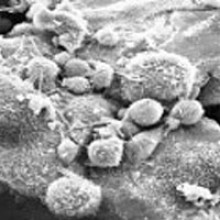
Is there any relationship between stem cells and cancer?
Kat - Now it's time to look at your burning genetics questions. Reham Foad wants to know if stem cells are a reason for cancer, and if stem cells can cure cancer. To answer, here's Hayley Frend, who's studying for a PhD in cancer stem cells at Cambridge University. Hayley - Scientists now believe that in at least some cancers, a subset of the cells exist which are far more powerful than any of the other cells in cancer. It's these cells which drive the growth and spread of the cancer, and we call these cancer stem cells. But that name is actually a little bit confusing because we don't really know if these cancer stem cells are normal healthy stem cells gone bad or whether they're actually derived from a different type of cell together. They could be a different type of cell which now looks a bit like a stem cell, but a bad one.
Kat - How are they actually involved in fuelling cancer?
Hayley - So, these stem cells are the ones that will divide lots of times to give rise to the tumour that you have in your primary cancer. But they're also the cells that will be able to break off and go elsewhere in the body and cause what we call metastases. This is when cancer can really accelerate and grab hold.
Kat - Can stem cells cure cancer?
Hayley - Well, if we're talking about the cancer stem cells I just described, well, if we can develop therapies to target these cells in particular, that would give us a really powerful weapon. It would be like using a sniper to take out the commander in chief. But there are also talks of using our normal healthy non-cancerous stem cells to treat cancer. So, these stem cell therapies are currently being used to treat cancers of the blood or bone marrow, or lymphatic system. And so, what these involve is harvesting a person's normal healthy stem cells or it could be a close relative and then using radiation to completely wipe out the cancerous tissue, for example, the lymphatic system. And then that gives you a completely blank canvass to re-implant those stem cells to give rise to a new healthy organ which doesn't have cancer. Although it's important to note, we can't use those treatments for all cancers and sometimes it's rather than a cure we're looking at, giving a patient more time. So now, it's probably a bit too much to say stem cells can cure cancer, they certainly give us another powerful weapon to use.

28:38 - Gene of the month - Cleopatra
Gene of the month - Cleopatra
with Kat Arney
And finally, our gene of the month is Cleopatra, named after the legendary Egyptian queen, who was said to have committed suicide with the aid of a poisonous snake - specifically, by allowing an asp to bite her on the bosom. The gene's thought to be active in developing fruit fly embryos, but faults in Cleopatra only cause problems when the developing embryos encounter a protein called Asp. Geddit? But despite the clever name, very little is actually known about the Cleopatra gene or what it does, so it remains as enigmatic as its namesake.










Comments
Add a comment